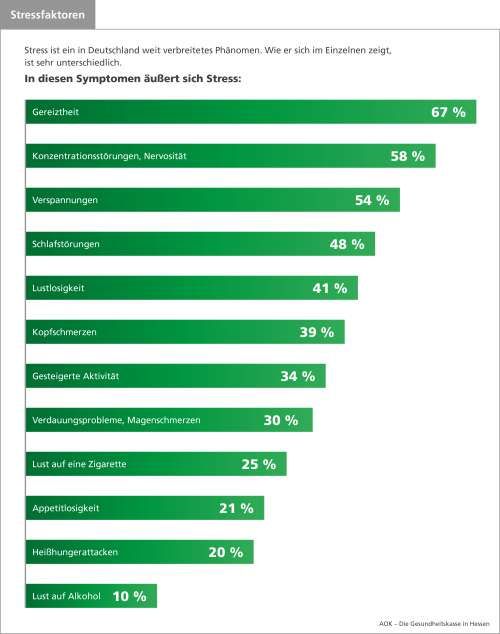Stress and tension as a permanent phenomenon
Germany suffers from stress, but the triggers of stress and tension are as varied as the people themselves. The following infographic shows which symptoms most often occur when people feel stressed.
“Stress is defined as a state of alertness of the organism, which adjusts to an increased readiness to perform.”
Basically, therefore, stress does not mean something negative, but rather the tension of the body to a specific goal.
Adrenaline and cortisol are released in the process. When the “danger” is over, the hormone level drops again. However, in certain situations this does not happen fast enough today, because the tension lasts permanently.
So the body reacts with certain symptoms that we attribute to stress. It is interesting that physical and mental reactions occur equally. Only those who know the symptoms can do something about the cause.
The infographic shows in which symptoms stress and tension are expressed.
For 67%, stress is most often manifested by irritability, followed by concentration problems and nervousness (58%) and tension (54%). Desire for alcohol can also mean a symptom of too much stress, but occurs only in 10%.
But how can you protect yourself from it? To do this, you should first know what can cause the stress.
Stress triggers
So-called stressors (stress triggers or. Stress factors) are different for everyone. In general, one can distinguish between physical environment (z.B. Noise, cold etc.), internal stimuli (pain, hunger, etc.), etc.), social stressors (interpersonal conflicts) and mental stressors – means the individual situation (z.B. Exam situations, time pressure etc.).
The best known is probably too much work as a trigger of stress. If the balance is missing and you spend your time only with work, most people show symptoms of stress at some point.
But even simple “brooding” can lead to stress symptoms. everyday worries can be grueling. Man reflects constantly, and too often and too long. Brooding over situations can end up being as stressful as the situation itself.
Reduce stress
So how to rid yourself of this burden before it makes you really sick?
As mentioned at the beginning, you have to know your own symptoms in order to be able to do something about the cause.
Coping with stress is just as individual and does not apply to everyone in the same way.
But these general tips can help you find your own path to personal stress management:
– Learn one Relaxation technique, z.B.: autogenic training or progressive muscle relaxation.
– Regular Exercise helps to release the tension. Sport reduces the stress hormone adrenaline. In addition, the body becomes permanently more efficient.
– Healthy Nutrition is important for energy production. So the body is more resistant, you feel fitter.
– Care for your Private life. Social contacts, a hobby, time with the family – all this must not be lost in the “everyday stress“. So you create a balance and can recover more easily.
– Sleep enough. In sleep the body gathers new strength. Not enough sleep can also cause additional stress.
However, if the stress starts to dominate you, you may suffer from the so-called “burnout syndrome”. How to recognize it and more info you can find here.
But remember, stress is not always negative. If it does not occur too often, stress can even motivate and increase one’s productivity. But as so often, the right measure is decisive!
